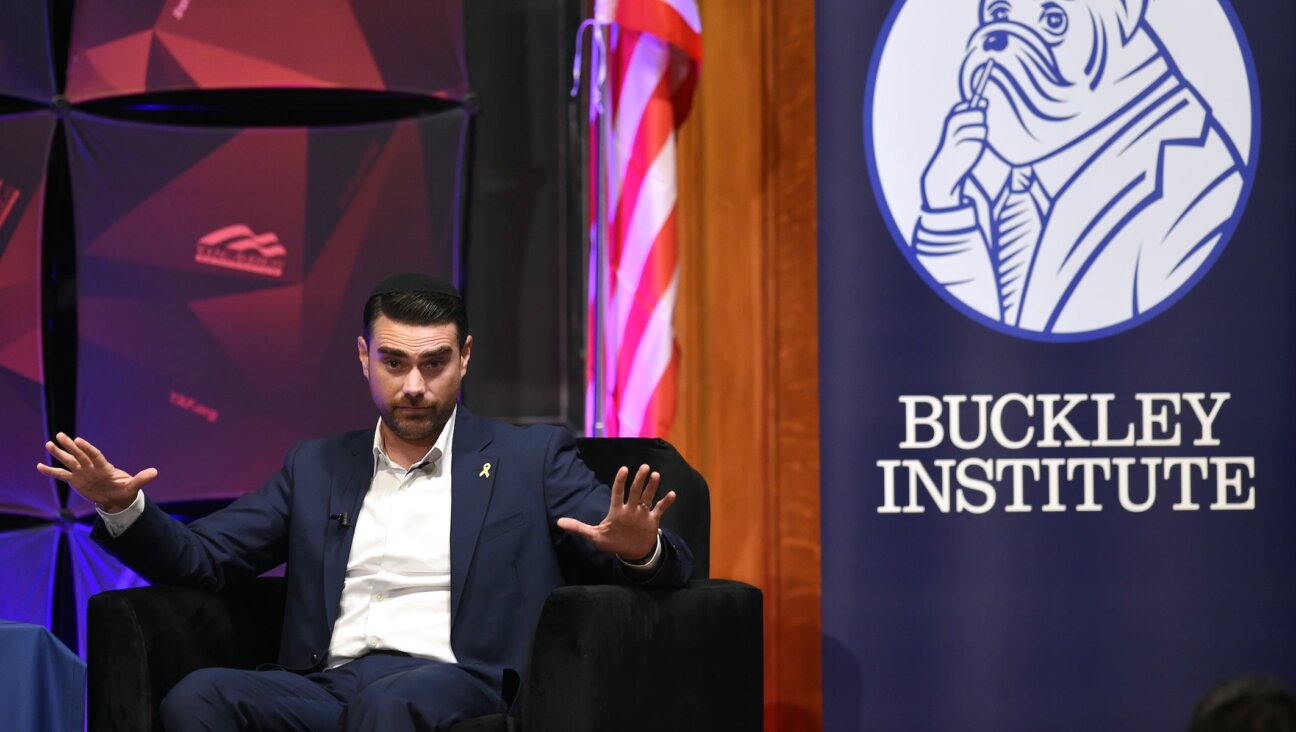In Romania, Preparing for the Future by Facing the Past
VIENNA — At 36, Mihai Razvan Ungureanu is something of a diplomatic wunderkind. Appointed in late December 2004 as foreign minister of Romania, Ungureanu has been tasked with leading the country’s international affairs during the most critical juncture in its post-communist history. On April 25, Romania is set to sign the European Union accession treaty, putting the country on course to become a full E.U. member on January 1, 2007.
The all-encompassing effort to shore up support in European capitals for Romania’s bid has left the young foreign minister with little time for his other professional pursuits. Maybe once a month at best, Ungureanu lamented recently to the Forward, he manages to hold office hours for his graduate students at the Center for Jewish Studies he founded last year at A.I. Cuza University and continues to direct.
Ungureanu himself is not Jewish. In fact, Iasi (pronounced Yash), the city in which he grew up and where the university housing the Jewish studies center is located, is considered to be the birthplace of modern Romanian antisemitism. Yet for the better part of his adult life, Ungureanu has dedicated himself to the scholarly study of the People of the Book.
Over a breakfast of bagels with cream cheese and lox at the Vienna headquarters of Centropa, an institute devoted to Central European Jewish history, Ungureanu bemusedly tried to explain to the Forward what seemed to him a perfectly natural career choice.
“There was no perverse reason for me to start looking into the history of the Jewish community in Moldova,” he said, referring to the Romanian province that borders the nation of the same name. “I was interested in the social history of the Romanian principality, and from question to question, I slowly drifted toward the history of the Jewish community. What I found there was a fantastic treasure of data and information that was just waiting for someone to collect and interpret them.”
And collect and interpret he has. A standing member of the European Association for Jewish Studies, Ungureanu has published more than 100 scholarly works, bearing such titles as “‘Imaginary Jew’ versus ‘Real Jew’ in Romanian Folklore and Mythology,” “Two Recurring Motifs in the Book of Lamentations and Their Later Midrashic Interpretation” and “Jews Versus Jews in 1834 Moldavia.” Before he reached his 30th birthday, his scholarship had already earned him appointments as a senior fellow at Great Britain’s Oxford Center for Jewish and Hebrew Studies and as a Felix Posen fellow at the Hebrew University in Jerusalem.
In 1998, Ungureanu was brought into the government by then-foreign minister Andrei Plesu to serve as deputy minister, and was given responsibility for the all-important Europe portfolio. Within three years, the young historian had risen to become Romania’s regional emissary to the Stability Pact for South Eastern Europe, an intergovernmental conflict-prevention organization based in Vienna. While regional emissary he found time to teach at the NATO School and the George C. Marshall European Center for Security Studies, both in Germany. In 2003, he was appointed deputy coordinator of the Southeast European Cooperative Initiative, another Vienna-based regional organization with close links to the Stability Pact.
Although Ungureanu moved his main office from the ivory tower to the halls of power, he readily admits that his academic inclinations continue to guide his work in the Foreign Ministry. In order to write the next chapter in Romania’s history, he says, the government must impress upon his fellow countrymen the need to take a candid look at their past.
“We all know that there is a certain kind of antisemitism that activates especially when Jews are absent,” he said. “That’s not the case in Romania. What our difficulty is, is to come to terms with our own history. That’s the most difficult part, simply because in 60 years of communism, references to the Holocaust, or references to the history of the Jewish community in between 1938 and 1945, had no room in textbooks, and therefore no access to public memory.”
The degree to which Romanian collusion with the Nazis has been whitewashed from the country’s collective consciousness was brought home in 2003, when the government issued a communiqué stating that no Holocaust had taken place on Romanian territory. International outcry at the denial of Romania’s role in the murder of nearly half its Jewish population prompted then-president Ion Iliescu’s government — which fell in 2004 to a coalition led by Ungureanu’s center-right National Liberal Party — to quickly retract its statement and implement a series of measures aimed at preserving the memory of the approximately 265,000 Romanian Jews killed. The country began observing a National Holocaust Day, a blue-ribbon historical commission was established and property restitution was given greater immediacy.
Last November’s federal elections, however, suggest that long-held beliefs in Romanian society are not so quickly reversed. The leader of the nationalist Greater Romania Party, Corneliu Vadim Tudor, won an eighth of the votes for president. Members of his party, which has been called antisemitic and xenophobic by both domestic and foreign observers, captured more than 14% of the 479-seat parliament.
While acknowledging that anti-Jewish sentiment has not entirely disappeared since the reintroduction of democracy, Ungureanu is quick to point out the progress the country has made toward pluralism since the collapse of communism left Romanians in a moral vacuum.
“I found out in digging into people’s souls that there are lots of —” Ungureanu said, before catching himself. “In some of my former colleagues, antisemitism could only wait for the proper moment to burn. But this was in the early 1990s, when prejudices surfaced again because there were no ideological bounds, no ideological censorship that would make people think twice when referring to cultural differences. This upsurge of prejudice faded out quite quickly.”
Whether such prejudices will make a return to mainstream Romanian society depends, by most accounts, on Bucharest’s ability to gain accession to the E.U. and bring home the expected benefits of membership. In a move clearly intended to signal to Brussels that Romania is making a clean break from its past, recently elected President Traian Basescu picked a Cabinet with few ties to previous corruption-tainted governments or to the communist-era dictatorship. Indeed, the average age in the Cabinet is 44, and at 36, Ungureanu is only its fifth youngest member. Four ministers were still teenagers when dictator Nicolae Ceausescu was removed from power and executed on television in 1989.
Ungureanu’s deputy minister, Lucian Leustean, is himself only 37. Like his boss before him, Leustean is in charge of the foreign ministry’s European affairs. And like his boss now, Leustean concurrently holds a position — deputy director — at the Center for Jewish Studies in Iasi.
For Ungureanu, the decision to stack Romania’s foreign service with young, Western-leaning Ph.D.s such as Leustean was academic — but even as he puts together the diplomatic team that he hopes will bring Romania E.U. membership, he’s still on the lookout for a good Jewish studies scholar.
“I’m collecting all my colleagues from Iasi and bringing them to Bucharest,” he said with a laugh and the smallest of twinkles in his eye. “Now I have to find some other people that are at least as energetic and as interested in the material as we are.”
















